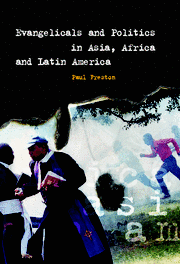Book contents
- Frontmatter
- Contents
- Foreword by David Martin
- Acknowledgements
- List of abbreviations
- Introduction
- PART ONE BRAZIL
- PART TWO ASIA
- PART THREE AFRICA
- 9 Sudan
- 10 Angola
- 11 Mozambique
- 12 Zimbabwe
- 13 Malawi
- 14 Rwanda
- 15 Uganda
- 16 Ghana
- 17 Kenya
- 18 Zambia
- 19 South Africa
- 20 Nigeria
- PART FOUR SPANISH-SPEAKING LATIN AMERICA
- Conclusion
- Bibliography
- Index
- Frontmatter
- Contents
- Foreword by David Martin
- Acknowledgements
- List of abbreviations
- Introduction
- PART ONE BRAZIL
- PART TWO ASIA
- PART THREE AFRICA
- 9 Sudan
- 10 Angola
- 11 Mozambique
- 12 Zimbabwe
- 13 Malawi
- 14 Rwanda
- 15 Uganda
- 16 Ghana
- 17 Kenya
- 18 Zambia
- 19 South Africa
- 20 Nigeria
- PART FOUR SPANISH-SPEAKING LATIN AMERICA
- Conclusion
- Bibliography
- Index
Summary
Site of the ancient Catholic kingdom of Kongo and a Portuguese presence since the sixteenth century, modern Angola was a product of the Congress of Berlin, and ‘in effect a confederation of three colonies in Portuguese West Africa … Angola lacked a cultural, educational, economic and administrative unity on which the aspirations of black politicians could be focused. The south knew little of Luanda’ (Birmingham 1992: 24ff.).
The Catholic Church was not able to provide that unity. It was very weak on the ground at the end of the nineteenth century, its missionary presence crippled by metropolitan policy towards the religious orders. In the early twentieth century, the Republic also pursued an anti-clerical policy. In addition, the Catholic Church came to be highly identified with the white settlers (as many as half a million) and, after the Concordat of 1940, with the Salazar government's policy of Portugalization.
Not surprisingly, it was from Protestant ranks that the leaders of all three independence movements (Agostinho Neto of the MPLA, Jonas Savimbi of Unita and Holden Roberto of the FNLA) emerged. But once again, geographical unity was lacking. The Protestant missions, established from the 1870s onwards, were in three separate groups, ‘a division that was to have fundamental long-term consequences for the evolution of Angolan nationalism’ (Birmingham 1992: 24). Methodists took the centre, Congregationalists the south, and Baptists the north. It is thus impossible to understand modern Angolan politics without taking Protestantism into account.
- Type
- Chapter
- Information
- Evangelicals and Politics in Asia, Africa and Latin America , pp. 119 - 121Publisher: Cambridge University PressPrint publication year: 2001



